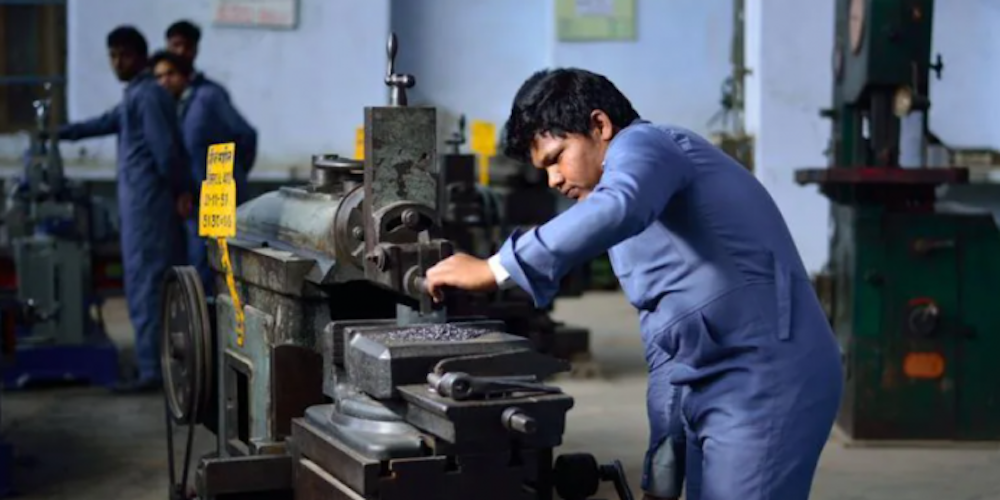Linking of Vocational and Higher Education

Minister of State for Education, Dr. Subhas Sarkar has told the Parliament that National Education Policy (NEP) 2020 advocates integration of vocational education with mainstream education in a phased manner.
Accordingly, University Grants Commission (UGC) has facilitated Higher Education Institutions (HEIs) to offer skill-based programmes under National Skill Qualification Framework (NSQF).
The objective of NSQF is, inter alia, to integrate relevant skills into the higher education system in order to make higher education relevant to the learners and the community.
In addition, UGC has also notified guidelines on Internship/Apprenticeship Embedded Degree Programme in the year 2020. As per the UGC Guidelines, any Undergraduate (UG) degree programme is eligible to embed Internship/Apprenticeship into the degree programme. While UGC’s programmes for skill-based education emphasize on developing a skilled workforce with vocational education, this emphasis on Internship/Apprenticeship is to improve the employability of students in the general stream.
All India Council for Technical Education (AICTE) has also brought out flexibility in the eligibility criteria for admission in Engineering courses in order to integrate skilling courses. It allows candidates having one of the vocational subjects as recognised by CBSE/ State Education Boards / or having B. Voc in specialised domain, for admission through lateral entry into 2nd year of B. Tech Programme in AICTE-approved Institutions.
AICTE has launched Kaushal Augmentation and Restructuring Mission of AICTE (KARMA) Scheme for AICTE approved Institutions and Centrally funded Technical Institutions. Under this scheme Institutions are approved for providing Skill training as per NSQ Framework to School Drop Outs, Students Perusing their degree/Diploma and to willing School students of CBSE, State Boards in the vicinity of Institutions. Till February 2022 more than 1000 institutions have registered on the KARMA portal.
In addition, Indira Gandhi National Open University (IGNOU) is offering Certificate, Diploma, Master degree level vocational programmes in the areas of Information Security, Business Process Outsourcing; Finance and Accounting, Communication and IT Skills, Fashion Design, Modern Office Practice, Pharmaceutical Sales Management and Entrepreneurship.
IGNOU acts as a national resource centre having twenty-one Schools of Study offering skill and competency-based programmes across a diverse range of disciplines, including the above stated areas.
It may be noted that in the past, few graduates of initial vocational training aspired to higher levels of education. But now all over the world higher-level qualifications are now a common expectation among young people, reflecting increased ambitions, labour market demand for higher-level skills, and a need to upskill and reskill throughout life.
At the same time, the perception of academic school education as the natural route to university underlines the importance of demonstrating that technical and vocational education and training (TVET ) programmes can also open a pathway to lifelong learning, including higher education. United Nations Educational, Scientific and Cultural Organization(UNESCO) , of which India is a member, and other international bodies are now giving increasing attention to opportunities for further learning for TVET graduates.
UNESCO has recommended that ‘Member States should develop pathways and facilitate transitions between secondary, post-secondary and tertiary education including flexible admission procedures and guidance, credit accumulation and transfer, bridging programmes and equivalency schemes that are recognized and accredited by relevant authorities. TVET institutions, and other education institutions and authorities, should collaborate for the implementation of such measures’
Successful implementation of the policy allows those with TVET qualifications or practitioner backgrounds to have a full opportunity to benefit from further, post-secondary (including higher) education. This does not mean that those with TVET backgrounds ‘should’ pursue post-secondary or higher education, but rather that they should face no unreasonable hindrances if they wish to do so.
Linking vocational and higher education serves many goals:
• Increases the attractiveness of initial TVET by meeting student aspirations, and remove any perception of TVET tracks as dead-ends;
• Reduces inequality, including gender inequality, and promote social inclusion and mobility, by opening up post-secondary education to a wider group of people, including the most disadvantaged;
• Helps to meet growing economic demands for higher-level skills and qualifications
• Supports lifelong learning, so that individuals can continue to develop knowledge and skills throughout their adult lives, and economies can adapt the skills of the workforce in response to technical and economic change
• Removes artificial barriers, such as requirements to repeat course material, that increase the costs of learning and prevent some from realizing their full potential.



